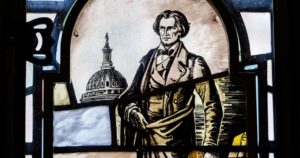
A stained-glass window depicting John C. Calhoun, a Yale alumnus who strongly supported slavery as a “positive good” system, was broken during protests last year.
After a year of intense debates and on-campus protests, Yale University announced plans to finally remove the name of avid slavery defender John C. Calhoun from one of its residential colleges. The hard-fought decision came Saturday, Feb. 11, after university president Peter Salovey met with the institution’s Board of Trustees.
“The decision to change a college’s name is not one we take lightly, but John C. Calhoun’s legacy as a white supremacist and a national leader who passionately promoted slavery as a ‘positive good’ fundamentally conflicts with Yale’s mission and values,” Salovey said. “I have asked Jonathan Holloway, Dean of Yale College, and Julia Adams, the head of Calhoun College, to determine when this change best can be put into effect.”
Saturday’s announcement was a complete about-face for the university president, who, last year, stopped short of stripping Calhoun’s name from the residential college because he felt that keeping it would “encourage the campus community to confront the history of slavery and teach that history and its legacy.” His previous decision sparked fiery protests and wide-spread condemnation, leading university officials to reconsider removing the name. Before that, however, the school created a formal system to weigh requests for such name changes.
While Salovey and the Yale board decided to remove the infamous slaveholder’s name from the residential college, he said other symbols depicting Calhoun’s legacy wouldn’t be dropped from other areas/buildings on campus.
“In making this change, we must be vigilant not to erase the past,” the president wrote in a letter. “To that end … we will not remove symbols of Calhoun from elsewhere on our campus, and we will develop a plan to memorialize the fact that Calhoun was a residential college name for 86 years. Furthermore, alumni of the college may continue to associate themselves with the name Calhoun College.”
The building that formerly bore Calhoun’s name will be renamed to honor Grace Mary Hopper, a mathematical computing pioneer who earned her master’s and doctorate degrees from Yale in the 1930s, Yale News reported. Hopper went on to enlist in the U.S. Navy, where she used her math genius to fight fascism during World World II. Salovey described the Yale alumna as “an exemplar of achievement in her field and service to her country.
“As we considered potential namesakes … this community’s input was indispensable,” the president said. “Hopper’s name was mentioned by more individuals than any other, reflecting the strong feeling within our community that her achievements and life of service reflect Yale’s mission and core values.”
Students who’d previously protested the school’s decision to retain Calhoun’s name rejoiced at the news that their demands were finally being heard. Racial tensions plagued the campus last year as students, faculty and staff rallied against Calhoun’s namesake, who they argued was a clear representation of the institution’s racist past and its dark ties to the enslavement of Black people. A dishwasher employed at the university’s cafeteria even went so far as to shatter a stained-glass window depicting Calhoun to get his point across.
“There’s a huge sense of relief and celebration,” 21-year-old student Rianna Johnson-Levy told The New York Times. “Students of color have been fighting for this change for decades and it’s hard to believe this day is finally here.”
Other students celebrated the victory by quoting inspirational quotes by Hopper, who passed away in 1992.
Not everyone was thrilled about the scrapping of Calhoun’s name, though. Fox News personality Geraldo Rivera stepped down from his position at the Ivy League school following news that the white supremacist’s name would be replaced. Rivera took to Twitter Monday to voice his frustration over the school’s “political correctness.”
Resigned yeterday as Associate Fellow of #CalhounCollege at #Yale. Been an honor but intolerant insistence on political correctness is lame.
— Geraldo Rivera (@GeraldoRivera) February 12, 2017


